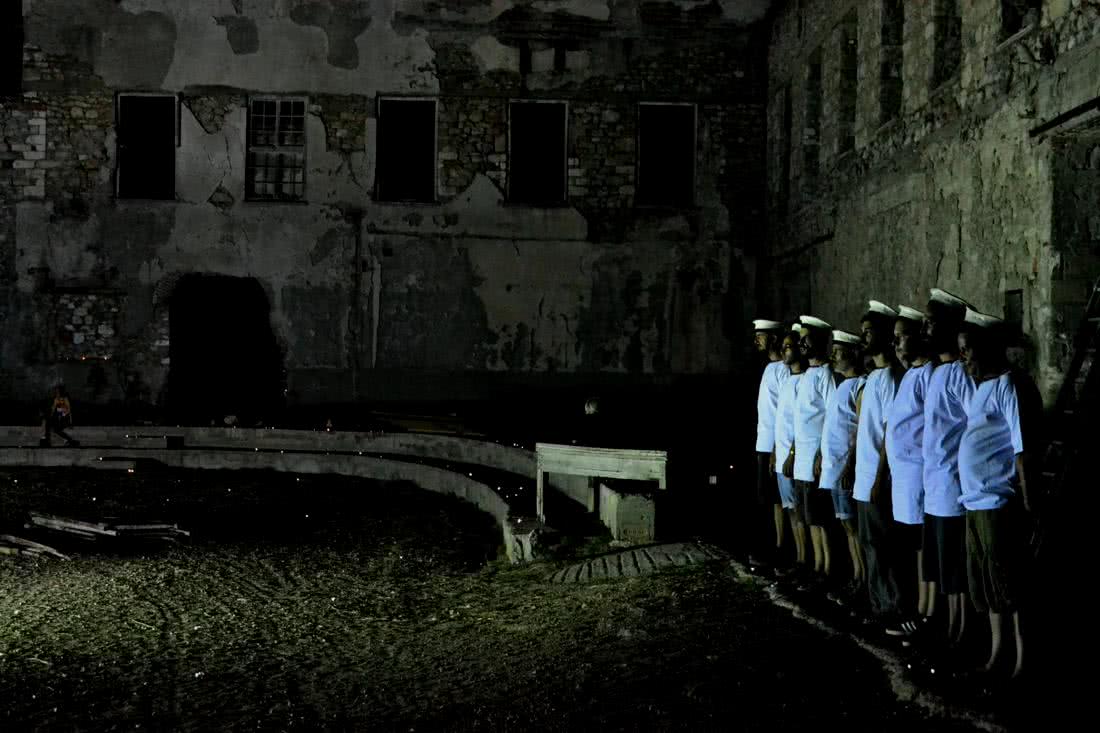SOPHOCLES AJAX -Third draft 2014
Translation: Nicoletta Frintzila
Direction: Martha Frintzila
Music, Set design: Vassilis Mantzoukis
Light design: Felice Ross
Costume design: Ilianna Skoulaki
Assistant Director: Despina Tsafitsa
Photographer: Orfeas Emirzas
Video: Aris Zagklis
Attiko School of Ancient Greek Drama 2013-2014: AJAX by Sophocles
This year's research concerns the integrated presentation of the work Ajax by Sophocles and focuses on the relation of the ancient drama with the Greek popular theatre, the popular shadow theatre and the popular activities and traditions.
For this purpose, during the 9month program, seminars are scheduled with the following themes:
the actor in the service of figure/ the body in the service of form
the construction of a figure – role
the tragic nature of the popular shadow theatre and the popular nature of the ancient tragedy
the progress from written speech to free association
the physical hero and the thinking man
In 2006 the theatre company Dromos me Dentra in cooperation with the Research and Practical Application Centre of Ancient Greek Drama “Desmoi” realized a theatre seminar under the title Ajax- The ancient drama through the shadow theatre. The result of this seminar project was an open rehearsal of Ajax in May 2006 in Kratiras Cultural Space. The completed version of the performance was presented as a work in progress in the Greek National Theatre in the period 2007-08.
The shadow theatre
The shadow theatre is the only token of popular theatre that has survived up to now in our country and our connection to the heroic theatre of older times. It has presented heroic figures of the ancient times (Theseus, Hercules, Alexander the Great, Antiochus, Oedipus) in an exceptionally functional manner, while it constitutes one of the most interesting ways to approach a mythic hero. Although its characters are extravagant in their expressions and naïve in their appearance, they convey the spirituality and the mystery of an older world, while through the ethics and the humility of this theatrical kind, the connection to the myth, which is the foundation of the ancient tragedy, is accomplished.
Ajax as a figure
In the performance Ajax appears as a shadow theatre supernatural figure, inspired by the depictions of the hero in the ancient Greek pottery painting. We were led to this choice not only by the figure of Ajax itself as presented in the text of Sophocles (a figure that is incomrehensible, one- dimensional and uncompromising, fighting with its darkness and the solitude of its fate),
but also by the significance of the shadow in the text, a repeated pattern, almost an obsession of the writer:
Odysseus: (…) I see that in our lives we are no more than phantoms, insubstantial shadows...
Agamemnon: (…) For a man no longer living, that has become a shadow…
Tecmessa: (…) and he was speaking with a shadow about the sons of Atreus…
Whoever listens to Ajax is not able to understand him, as a human in flesh and blood is not able to understand a paper puppet longing for a place within the living world.
AJAX – The tragedy of man
The work Ajax by Sophocles is constructed into two distinct conceptual units:
The delusion and rage of Ajax prevail in the first part that reaches its peak at the moment of his suicide, while in the second part a quarrel flares up about the fortune of the hero's remains, which takes place around his dead body, an argument between the sons of Atreus and his relatives resulting in the burial of the hero and the rendering of the funereal honours that he deserves.
The significance and value of the tragedy's second part is often mistaken and downgraded by the scholars, who tend to treat “Ajax” exclusively and only as the tragedy of the suffering hero, who with his agonizing decision to commit suicide is led to redemption. Redemption though does not entail the hero's vindication.
Ajax bids farewell and withdraws, because he realizes that he constitutes a dissonance in this new world that has emerged, in this new world order, where deceit, conspiracy and cunning prevail, deception is rewarded, gods conspire, the unworthy worth.
The hero's passions do not cease to exist with his death, Ajax “exists” after life and still suffers, since his life identifies with his honour, since his code of honour is a code of existence.
He breathes his last breath out, but his fate is still at stake and not yet determined, that's why his agony remains alive and intensifies with his suicide; the hero leaves but does not rest.
Ajax is the last representative of an old heroic world, a world in the agony of death that finally fades away, not with his death but with his burial.
The hero is so unbearably present as dead that manages to fill with his living absence the souls and the words of all the attendees or participants of the quarrel for his remains. His body is still on stage, his voice is heard.
His people become his mouthpieces: the brother, the comrades, his wife, who are tasked to execute his last order: to care for him, not to leave him exposed to the enemies.
As compared with his other tragedies, Sophocles in Ajax shows utmost diligence in the thourough study of a personality. A personality and a temperament that is melancholic and that due to this melancholy is able to embrace the whole length and breadth of the human experience.
Plot
After the death of Achilles, the Achaeans decide to cast a lot over who should receive his armour. The two candidates are Ajax and Odysseus. After a voting the armour is awarded to Odysseus and the injured by the result Ajax, certain that the armour, which he rightfully deserved, was taken from him by fraud, decides to take revenge for this disgrace by murdering Odysseus and the two leaders, Agamemnon and Menelaos. As he bursts into the camp, Athena sends madness upon him and throws him enraged into the army's flock. He starts slaughtering sheep and oxen, believing that he is slaughtering Greeks. He grabs a ram and leads it into his tent, where he tortures it pursuaded that he tortures Odysseus. The next morning faced with the result of his actions, he realizes the disgrace and decides to commit suicide. After the death of Ajax, the two leaders decide to take his body and defile it by leaving it unburied, a prey to the dogs and vultures. Ajax's brother, Teucrus shows a remarkable boldness by claiming his body, without considering the results of his actions.
Odysseus intervenes and saves the body of Ajax, thus repealing the existing laws concerning the fate of traitors. In this way the reputation of Ajax is restored and Odysseus shows his greatness by honouring his enemy.












































